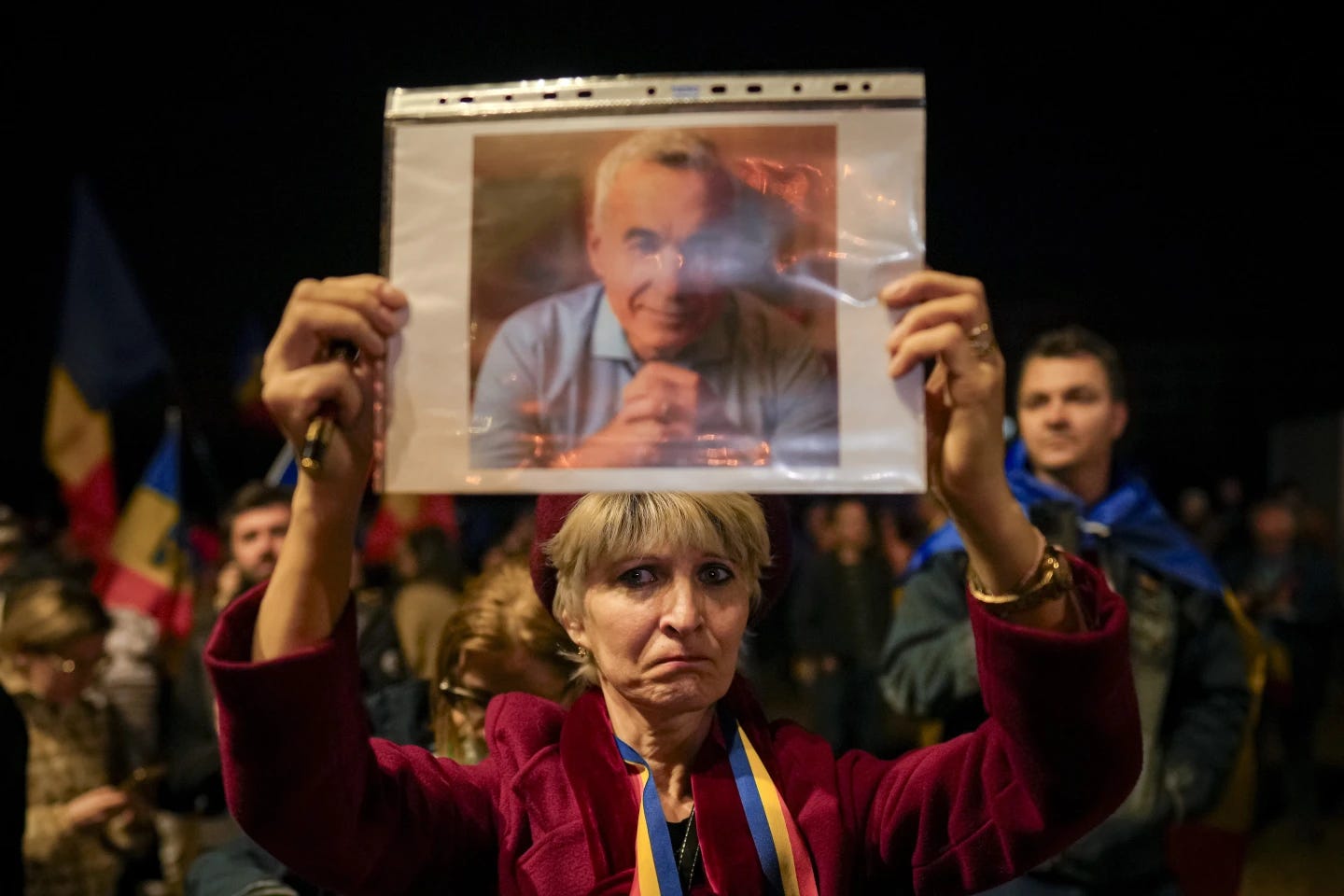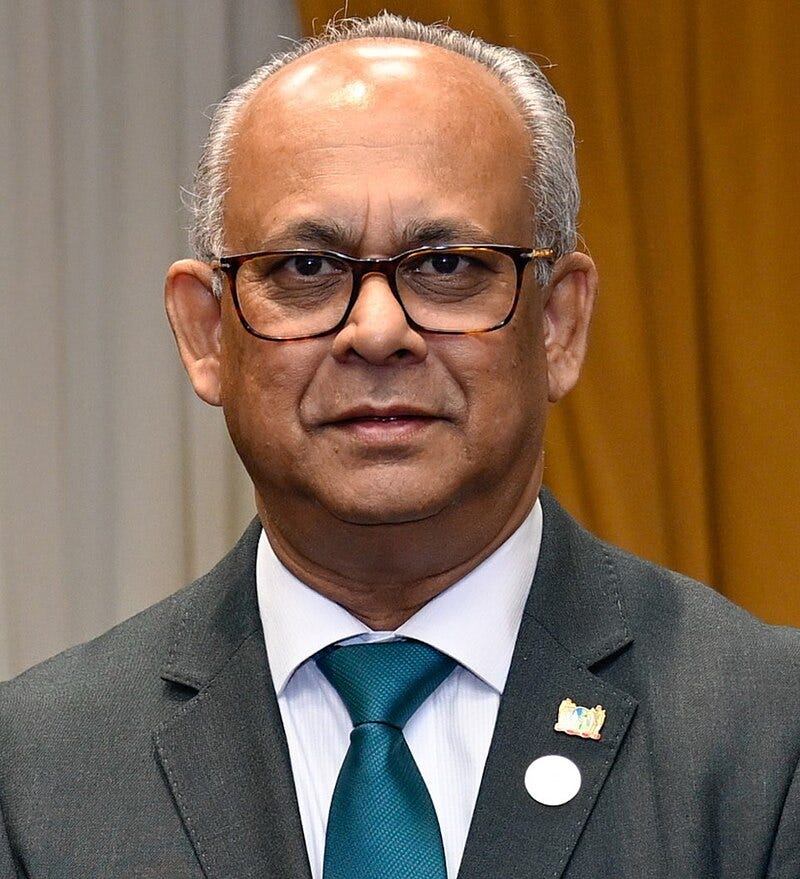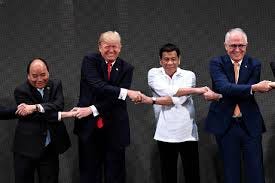More foreign affairs in a crazy, mixed-up world
Expelling ambassadors for all the wrong reasons; updates on Romania, Suriname, The Philippines
As a “reformed” Foreign Service Officer, I keep my eyes out for unusual and outrageous events occurring in countries of interest to the United States, particularly those I have served in or visited. This occasionally includes analyses of U.S. actions affecting those countries, whether wise or effective—or neither—and in some cases, simply puzzling.
I woke up this weekend to reports that Marco Rubio—the neophyte U.S. Secretary of State—has expelled the veteran South African ambassador, apparently for the flimsiest of reasons: personal remarks about the Trump administration’s MAGA political base that were perceived as unflattering.
Expelling South Africa’s top diplomat here, Ephraim Rasool, means that if South African chooses, the ranking U.S. diplomat in Cape Town—charge d’affaires Dana Hunt, the deputy chief of mission, since we have no sitting ambassador—could be p.n.g.’ed as early as this week, with no explanation.
I have never visited or served in South Africa, but have friends from there. Although its current politics are sometimes mystifying to outsiders, it is, in fact, a functioning democracy, notwithstanding its current membership in BRICS and other ties to far-less-democratic Russia. Its relationship to the United States, however, has remained a friendly one for decades. Rasool, who previously served as ambassador to the United States from 2010 to 2015, was reappointed just a week before Donald Trump’s inauguration in January.
Tit-for-tat expulsions of diplomats are fairly common, for all kinds of reasons—and not just on charges of espionage or overly fraternizing with the opposition—but rarely involve ambassadors. Rasool’s expulsion is a very serious move, of course, all but tantamount to breaking diplomatic relations with South Africa—and one expulsion almost always results in a reciprocal move.
I am no expert on declaring a foreign diplomat persona non grata—technically, it means “pack your bags and get out,” usually within 72 hours—but the last time the U.S. government did this to a foreign ambassador, to my recall, was in 2008, when we expelled Bolivia’s ambassador in Washington, to mirror the blatantly political expulsion of the U.S. ambassador in Bolivia after running afoul of the former president there, Evo Morales.
And as I understand diplomatic niceties, the ambassador is supposed to be called into the State Department personally and politely handed his walking papers—not fired by mindless tweet. So much for common courtesy or adherence to tradition in Trump’s Brave New World at the Incredible Shrinking State Department.
And although Trump began this process himself by attacking a new law recently passed by South Africa’s parliament—dealing with the limited expropriation of certain white-owned farmlands—it is inextricably tied up with the visceral anger expressed by his court jester-in-chief, billionaire businessman Elon Musk, over other South African actions, including delays in certifying his Starlink firm’s ability to function in South Africa.
The very-white South African native, who left it long ago to migrate to Canada and thence southward, has long opposed most actions taken by the country’s black-majority government. Trump also recently signed an executive order canceling all U.S. foreign aid to South Africa, reportedly at Musk’s rabid insistence.
According to the Associated Press,“ Rubio, in a post on X [Musk’s social media platform], accused Ebrahim Rasool of being a ‘race-baiting politician’ who hates President Donald Trump. Rubio declared the South African diplomat ‘persona non grata.’” [See “Rubio says South Africa’s ambassador ‘no longer welcome,’” March16, https://apnews.com/article/rubio-south-africa-ambassador-trump-caf02606c61ee4b7945624a8f792ce1d# .]
He gave no reason, just a big hint: linking his tweet to a news report from a far-right-wing media group, Breitbart News, one of the few news organizations rumored to be routinely allowed in Trump’s pint-size daily intelligence briefing from Tulsi Gabbard. In a webinar on Friday, as reported by Breitbart, Rasool did not mention Trump by name but did criticize what he saw as racist undertones among Trump supporters, and rashly singled out Musk for serving as a “dog whistle” for white nationalists worldwide. He then had the temerity to mention DEI (diversity, equity, and inclusion), a phrase Trump has banned by fiat from his thesaurus of Newspeak words and phrases.
In Friday’s webinar, Rasool, speaking by videoconference, reportedly talked in academic language of the Trump administration’s crackdowns on diversity and equity programs and immigration.
“The supremacist assault on incumbency, we see it in the domestic politics of the U.S.A. … the Make America Great Again movement, as a response not simply to a supremacist instinct, but to very clear data that shows great demographic shifts in the U.S.A. in which the voting electorate in the U.S.A. is projected to become 48% white.”
Rasool further “pointed to Musk’s outreach to far-right figures in Europe, calling it a ‘dog whistle’ in a global movement trying to rally people who see themselves as part of an ‘embattled white community.’”
No longer a player in Washington’s diplomatic scene, Ephraim Rasool is officially PNG. Public domain photo
Rasool’s expulsion is the second major diplomatic action this month involving world ambassadors who have indirectly criticized Trump and his administration’s actions, albeit in unofficial remarks.
New Zealand’s foreign minister recently fired his country’s High Commissioner to the United Kingdom, Phil Goff, for posing a question at a think tank that questioned Trump’s understanding of history, as I mentioned last week. [See “Channeling Munich, 1938,” in this space, March 10.]
Given the increasingly thin-skinned nature of Trump and his jumpy apologists, Rasool may not be the last ambassador Rubio is forced to kick out after his boss’s next hissy-fit. Canada’s ambassador to the United States, Kirsten Hillman, could be headed back to Ottawa soon, if she keeps repeating, however gently, the heresy that most Canadians are not at all interested in becoming the 51st U.S. state—citing both old Prime Minister Justin Trudeau’s pointed “no way” and brand-new Prime Minister Mark Carney’s even more emphatic rejection of Trump’s oft-expressed desire to annex our northern neighbor.
Followed by Danish ambassador Jesper Møller Sørensen, who is (gasp!) gay, with a male partner and two young children—a veritable poster guy for detestable DEI!—and now has no choice but to try to explain, with a straight face, the negative official position of his nation on “selling” Greenland. Prime Minister Mette Frederiksen has repeatedly warned Trump about it in no uncertain terms. [See “Denmark PM Opens up,” February 20, https://time.com/7259818/exclusive-denmark-frederiksen-trump-greenland-interview/ .]
Along with the relatively new Swiss ambassador to Washington, Ralf Heckner, a veteran diplomat and serious-minded PhD in history, who may have an even harder time explaining the recent, vulgar but hilarious “spoof parade” in Basel. In a three-day festival that began on Ash Wednesday, piccolo-playing marchers dressed in “middle finger” costumes carried on a long tradition of satirizing global events.
You had to be there, I guess, to fully appreciate the humor. Photos courtesy Javier Camacho
[See “Switzerland’s Anti-Trump Protestors,” March 14, https://www.latintimes.com/switzerlands-anti-trump-protestors-wear-giant-middle-fingers-their-heads-during-march-578425 .]
At least sending ambassadors packing by tweet will give Miniscule Marco something to do beside twiddle his thumbs between trips abroad, while gung-ho deputy Pete Marocco burns down USAID—and with it, the U. S. government’s fast-dwindling international prestige.
* * * * * * *
Update from Bucharest: The historical home of Count Dracula is quickly becoming the world’s newest democratic laughingstock for its botched elections, as the restaged presidential election in May starts to take shape six months later—with at least one fewer player than before. The winner in the first round of the Romanian presidential sweepstakes in November, an obscure curmudgeon named Calin Georgescu, has been officially bounced from the list for the May 4 do-over.
According to the Associated Press, Georgescu was ruled ineligible to take part by the Central Election Bureau, citing last year’s decision by the Constitutional Court to annul the first election based on Russian interference—declassified proof of which mysteriously appeared at the last minute. “The bureau had cited in its decision on Sunday the Constitutional Court’s ruling last year to cancel the elections after allegations that there were electoral violations and that Russia had run a coordinated online campaign to promote Georgescu, who ran as an independent.”
Unrest predictably broke out on the streets of Bucharest when the Bureau’s decision was unveiled. Georgescu immediately appealed the ban to the Constitutional Court, which rejected his plea days later without explanation. [See “A top Romanian court upholds the ban,” March 11, https://apnews.com/article/romanian-court-upholds-ban-georgescu-election-665687a1a7fb9bebe3c87b5e2b90fc5b; and “Chaos in Romania’s capital,” March 9, https://apnews.com/article/romania-georgescu-election-d0541a5bc20ddf7be0689d1813f9495c .]
An angry Georgescu supporter holds her hero’s portrait up. Photo courtesy AP
But Romania’s shadowy power brokers weren’t through with the list. Also barred within days from taking his place as right-wing on the ballot was a controversial politician named Diana Sosoaca, a somewhat clownish ex-member of the European Parliament who donned boxing gloves to announce her replacement candidacy. Accused of “spreading pro-Kremlin propaganda and anti-Semitic views, she also opposed anti-Covid measures during the pandemic and, in July 2024, was expelled from the European Parliament in Strasbourg after loudly interrupting debates.”
No-no to Diana Sosoaca, too. Photo courtesy Vadim Ghirda/AP
Georgescu, a far-right professor without a party affiliation, had often praised Russian president Vladimir Putin in his campaign but claimed he did not favor stronger ties with Russia. He won votes from almost a quarter of Romanian voters in the first round of the election in November, followed by 19 percent for reformist mayor, Elena Lasconi; the two would have faced each other in a runoff in mid-December.
Representatives of the country’s two major parties—Social Democratic Prime Minister Marcel Ciolacu, a narrow third-place finisher, and former Liberal Prime Minister Nicolei Ciuca, in fifth place—were shut out from a runoff for the first time in recent history, sparking rampant rumors that the constitutional court was bribed to throw out the election.
The U.S. government—including Trump, Rubio, and even Elon Musk—blasted the Bureau’s recent moves, particularly those disqualifying Georgescu, as “undemocratic.” Meanwhile, President-for-indefinite-future Klaus Iohannis, who was not allowed to succeed himself for a third term, has continued himself in office after his term ran out in December; his release of top-secret documents in December led directly to the Bureau’s reversal of its position certifying the first vote.
Lasconi is expected to run again in May, perhaps joined by perennial far-right agitator George Simion, who placed fourth in November results but had then endorsed Georgescu. Two new candidates on the ballot appear to be Bucharest Mayor Nicusor Dan, an independent campaigning under the slogan, “Honest Romania,” and Crin Antonescu, the joint presidential candidate backed by Romania’s tripartite governing coalition (Social Democrats, National Liberals, and the small ethnic Hungarian UDMR party).
Tune in soon for more news from the strangest democracy on earth, as it develops.
* * * * * * *
Update from Suriname: The upcoming Surinamese presidential election—after the May parliamentary elections—is likely to come down to a face-off between current President Chan Santokhi and his political rival and kingmaker, Vice President Ronnie Brunswick, whose small party has entered into coalitions producing the last two presidents (the late Desi Bouterse in 2010 and 2015, succeeded by Santokhi in 2020).
Brunswijk’s close association with disgraced former president Bouterse—the man he once guarded in the military, then fought for almost a decade as a rebel insurgent—continues to be a source of friction. Brunswijk revealed in January, just after Bouterse’s death, that the two men had been in almost contact contact since Bouterse vanished in January 2024, just before he was due to be imprisoned for a 20-year term for his role in the murders of opposition figures in 1982, during his dictatorship period.
Brunswijk then claimed, somewhat imprudently, that the government knew as well as he did where the former dictator was the whole time—in a rural compound downriver from Paramaribo, the capital. It was an open secret, he said. Brunswijk had even visited him and talked on the telephone with him just before he died.
Santokhi’s government furiously insisted it knew nothing, and demanded Brunswijk provide all salient details voluntarily—or be arrested. But in the time-honored Surinamese tradition of doing little about anything but talking a lot, nothing has occurred in the two months since his revelation—and Brunswijk is still in office, doing whatever it is convicted drug offenders do. He cannot leave Suriname for fear of being arrested by Interpol. And arresting him at home, of course, would destroy the political balance.
Santokhi’s Progressive Party (VHP) and Brunswijk’s General Liberation and Development Party (ABOP) are almost certain to offer their names. Bouterse’s widow, Ingrid Bouterse-Waldring, the former First Lady, may also be a candidate in May, depending on who the Bouterse party, National Democratic Party (NDP), chooses as its candidate. There may be others.
Depending on the outcome of the parliamentary election, Brunswijk and the ABOP will almost certainly form a coalition with the winning party, if it garners 25 seats or fewer in the 51-seat body. Whether it is enough to vault Brunswijk into the presidency remains to be seen.
For those readers interested in exploring the current state of Surinamese politics more deeply, there is an excellent new background summary available from Global Americans [see https://globalamericans.org/suriname-after-bouterse/ .]
Whatever the outcome of the May elections, one important political player will not be around for the election: the current Foreign Minister Albert Ramdin, who has taken an important regional post instead, as Secretary General of the Organization of American States (OAS). The well-respected Ramdin, a VHP leader and former Assistant Secretary General at OAS, was recently chosen to head the large organization—the first Surinamese politician of any stripe to gain recognition for competence and authority outside the country in many years.
He succeeds Luis Almagro Lemes of Uruguay, OAS secretary since 2015, and like Ramdin, a former foreign minister for his home country. In Washington, Ramdin will now handle management of the 33-member group, representing most of the nations in the Western Hemisphere, most in Central and South America and the Caribbean, but including Canada, the United States, and Mexico in North America. (Venezuela withdrew in 2017; Cuba’s membership was suspended in 1962.)
Suriname’s Foreign Minister Albert Ramdin, now leaving Paramaribo to head the OAS. Public domain photo
Based in Washington, D.C., the OAS is a “multilateral regional body focused on human rights, electoral oversight, social and economic development, and security in the Western Hemisphere,” according to the Council on Foreign Relations. Its constituent agencies include the Pan American Health Organization, the Inter-American Commission of Women, the Inter-American Children’s Institute, the Pan-American Institute of Geography and History, and the Inter-American Institute for Cooperation on Agriculture.
Ramdin held a series of nonpolitical posts prior to becoming Foreign Minister under the Santokhi government in 2020, including consecutive stints as Assistant Secretary General. His departure will leave a large void of integrity in the Surinamese government, one not easily filled in a country plagued by nepotism and corruption.
* * * * * * *
Update from The Philippines: Former President Rodrigo Duterte intentionally withdrew his country from the International Criminal Court in 2019, in part to avoid his own arrest for crimes related to his political career and his war against drugs. But earlier this month, he was apprehended in Manila and arrested on a warrant issued by the ICC, and is now in The Hague, awaiting trial.
According to the New York Times, Duterte, 79, was arrested in Manila on March 10, then flown to The Netherlands. His supporters “said his detention was illegal, arguing in part that the I.C.C. had no jurisdiction in the Philippines because he had withdrawn the country from the court when he was president.
But in the warrant, a three-judge panel wrote that it was investigating killings during the time the Philippines was still a member of the court [before 2019]. And the nation remains a member of Interpol, which can seek arrests on behalf of the I.C.C. A representative of Interpol was present when Mr. Duterte was arrested.
His lawyers have since reported he is too ill to stand trial. Last fall, after, the Philippines’ House of Representatives launched an inquiry into Mr. Duterte’s drug war, the former president refused to testify in the House. He did, however, appear at a hearing in the Senate in October.
“For all of its successes and shortcomings, I, and I alone, take full legal responsibility,” he said of [his long-running] antidrug campaign. “For all the police did pursuant to my orders, I will take responsibility. I should be the one jailed, not the policemen who obeyed my orders.”
[See “For Duterte, signs of a reckoning,” March 10, https://www.nytimes.com/2025/03/10/world/asia/icc-philippines-rodrigo-duterte.html?campaign_id=60&emc=edit_na_20250311&instance_id=149647&nl=breaking-news®i_id=66543734&segment_id=193102&user_id=9e758cd9bf637abc0a14a155f872e540 .]
He is not the only family member facing legal difficulties. As noted in this blog previously, daughter Sara, the current elected vice president under President Ferdinand “Bong Bong” Marcos, was recently impeached by the country’s lower house. Charges against her include “a range of accusations that include plotting to assassinate the president [Marcos], large-scale corruption and failing to strongly denounce China’s aggressive actions against Filipino forces in the disputed South China sea.”
Despite their personal animosity and political rivalry, she was elected on a coalition ticket with Marcos in 2022, but later allegedly tried to have him killed so she could have his job. Her trial in the Filipino Senate, dominated by Duterte supporters, is slated to begin later this year, but is not likely to result in her removal from office.
“Early in his administration, Mr. Marcos indicated that he would not cooperate with the I.C.C. But ties between Mr. Marcos and Ms. Duterte unraveled quickly and in spectacular fashion,” the Times wrote. “By late 2023, Mr. Marcos’s government had quietly allowed I.C.C. investigators to enter the Philippines,” resulting in his surprise arrest last week.
During his 22 years as mayor of Davao and one term as president (2016-2022), Duterte pursued a deadly war against drugs which reportedly resulted in thousands of deaths, for which he won worldwide notoriety but scattered praise, especially from Donald Trump. Duterte’s presidency overlapped with that of Trump’s first term (2017-2021) as U.S. president.
Trump has not yet commented on Duterte’s recent arrest, but as long ago as 2017, had nothing but good things to say about him, especially in an interview that year with The Guardian, when he mentioned “we had a great relationship.” [See “Trump hails great relationship,” November 13, 2017, https://www.theguardian.com/us-news/2017/nov/13/trump-hails-great-relationship-with-philippines-duterte .]
Trump and Duterte (center) during an ASEAN meeting in Manila, 2017. Courtesy Wall Street Journal
Next time: More foreign affairs in a crazy, mixed up world









